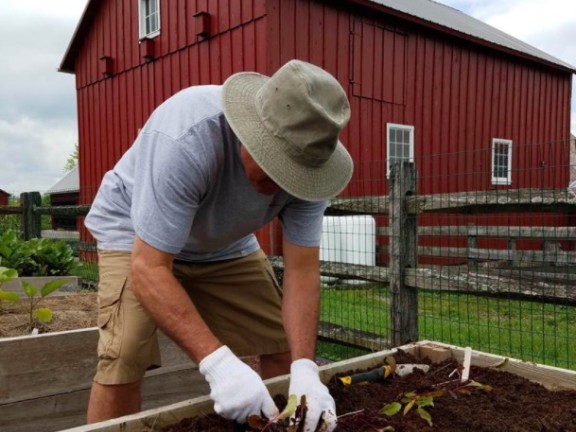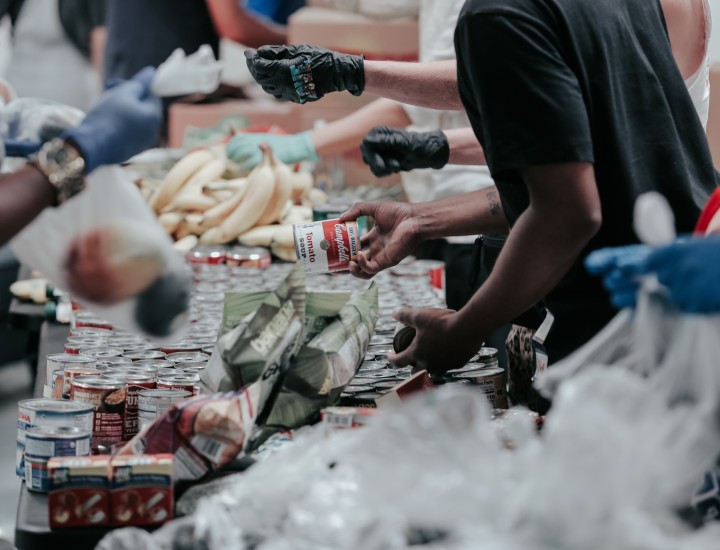Tackling food insecurity: Best practices from Bucks, Chesco, Delco and Montco

Chester County Food Bank manages raised bed gardens at Springton Manor Farm in Glenmoore, where volunteers help grow food specifically for the organization's constituents. Courtesy photo used in article.
As we've explored this month, poverty is unexpectedly present in Philly's suburban counties— and so is food insecurity, an invisible symptom of poverty.
While the food insecurity rates in Bucks, Chester, Delaware, and Montgomery Counties — 8.4, 8.3, 13.1, and 9.5 percent, respectively — don't rival Philadelphia's 21 percent, they mask dramatic community-level disparities.
In Philly and in the suburbs, food insecurity has many faces: those experiencing homelessness, working multiple jobs, unexpectedly affected by an emergency, and many others. When financial instability forces impossible decisions to be made about which bills to pay, food often gets cut first.
In the suburbs, however, communities are more fragmented due to scarce or nonexistent public transportation, assistance organizations are less aware of each other, and outreach to those who would benefit from resources is more challenging, according to Frances Sheehan, president of The Foundation for Delaware County.
So, how are organizations tackling suburban food insecurity? Here are some takeaways from those who are working there:
Listen to — and build — community
- Cathy Snyder, executive director of Rolling Harvest Food Rescue, founded the organization in Bucks County with the idea to connect healthy, fresh foods that would otherwise go to waste from farmers' markets with those who couldn't access it. But she soon pivoted, after learning from the community itself. “I'm not afraid to admit how much we got wrong in the beginning,” Snyder said. After learning from farmers, food pantries, and food recipients about their needs, Snyder streamlined the strategy: from pick-up days at farms to large-scale distribution events where partner organizations can take exactly what their clients need, and learn from cooking demonstrations, too.
- Balancing assets and needs also helped Chester County Food Bank's executive director Larry Welsch. For instance, the organization was able to install twin high-tunnel gardens at Patton Middle School, where just 5 percent of students are eligible for free or reduced lunch based on their family's income. The nutritious food they grow there is shared with students in the Kennett Consolidated School District, where 36 to 52 percent of students are eligible.
Provide more than food
- Manna on Main Street complements its work distributing food with a job-training program at North Penn Commons for Montgomery County and Bucks County residents. Training includes comprehensive culinary and customer service skills that are immediately put into practice through experiential learning in the Common Grounds Café and the Common Grounds catering program which fulfills daily orders for the co-located PEAK Center for seniors, and orders placed by local businesses and individuals. Graduates have gone on to careers at area restaurants, grocery stores, and colleges. Executive Director Suzan Neiger Gould hopes to continue increasing the program's capacity and eventually provide stipends that she believes will help retain trainees who juggle childcare and part-time work in addition to the training.
- In addition to its FRESHstart Kitchen™, which trains those with barriers to employment for sustainable careers in the food service industry, Chester County Food Bank works to help folks manage their health. The organization partners with clinicians at two low-income health providers — The Clinic and La Comunidad Hispana — and the Veterans Administration Hospital in Coatesville, to offer fruit and vegetable prescriptions for patients to use as vouchers for produce at the food bank's Fresh2You Mobile Market.
- After 35 years, Philabundance is expanding its effort from ending hunger “now” to ending hunger “for good,” according to Director of Communications Stefanie Arck-Baynes. “We couldn't keep doing the same thing when the endgame is to put ourselves out of business,” Arck-Baynes said. With a grant from HealthSpark Foundation, Philabundance's financial stability pilot program with seven MontCo families is underway, in collaboration with Habitat for Humanity of MontDelCo and the Pottstown Cluster of Religious Communities. The program includes financial literacy training, such as building emergency savings and developing a specific plan for stability, and individual coaching. Knowledge gained and intention to act, among other measures, will be used to evaluate the program's effectiveness and make adjustments as needed for future cohorts.
Philanthropy's unique role
- The Foundation for Delaware County is exploring ways to bring DelCo's diverse communities together around a common goal because, as Sheehan describes, each community is key to the county's success as a whole. She believes philanthropy has a unique opportunity to bring together a coordinated network of community, nonprofit, and government stakeholders. “Delco collectively has the brain power to succeed,” said Sheehan. “No one entity can do this work alone — here or anywhere.”
- Tamela Luce, senior program officer at HealthSpark, also believes philanthropy has an advantage in taking a 30,000-foot view. To prepare organizations for the uncertain future of government social service funding, HealthSpark wants to guide them toward capacity- and network-building through structured cross-issue conversations. “People take for granted the time it takes to build that trust to collaborate, but it is essential for smooth partnerships,” said Luce.
- Welsch hopes funders will do even more to seek out and encourage collaboration so that nonprofits work together in the best way for the client. He cites the creation of the North Penn Commons in MontCo — supported by HealthSpark — and CityLink in Cincinnati, Ohio, as successful examples made possible through unified capital campaigns.
A trauma-informed approach
Still, the rate of food insecurity around Philly hasn't changed significantly since the 2007-2009 recession led to a nationwide spike.
Mariana Chilton, professor at the Dornsife School of Public Health at Drexel University, director of the Center for Hunger-Free Communities, and co-principal investigator of Children's HealthWatch, believes that “we should be doing everything we can to get nutritious food to as many people as possible without letting big food corporations and government off the hook.”
But, for her, doing so doesn't require food.
Some of Chilton's recent research has come out of the Building Wealth and Health Network, a program for parents and caregivers of young children. The program increased food security from 47 to 71 percent in six months among a cohort of 369 people that participated in its second phase, using a model based on financial empowerment and peer support.
Chilton wants to see more organizations using a trauma-informed approach like the Network's in working with food insecure communities and advocating to improve food systems, government assistance programs, and working conditions — including paying a living wage, offering paid time off, and providing better childcare and insurance options.
Ultimately, moving the dial on hunger in Philly's suburbs and across the U.S. will require different kinds of proven ingredients for success. It will require a balance of meeting emergency needs with fresh, nutritious foods in a dignified way and working to end the cycle of financial instability at the root of food insecurity — and of poverty overall.
Because, as Luce said: “Long-term solutions are the goal, but you also don't want to tell someone, ‘I'm sorry, I can't help your hungry infant now, that's not part of my long-term plan.'”
By Elina Tonkova. From Generocity. (March 28, 2019). Tackling food insecurity: Best practices from Bucks, Chesco, Delco and Montco. Retrieved from: https://generocity.org/philly/2019/03/28/tackling-food-insecurity-best-practices-from-bucks-chesco-delco-and-montco/


